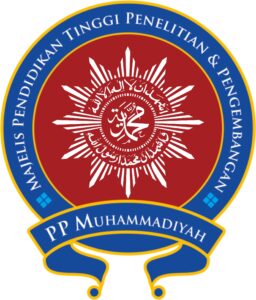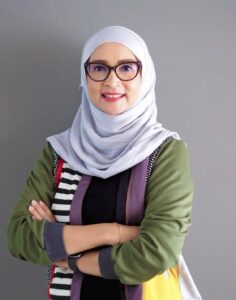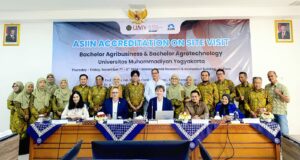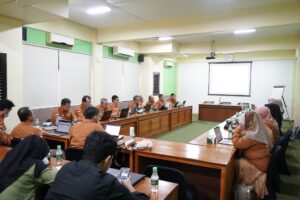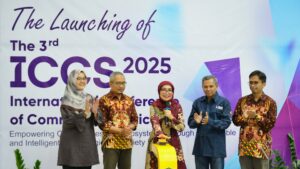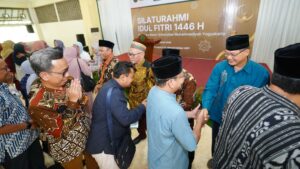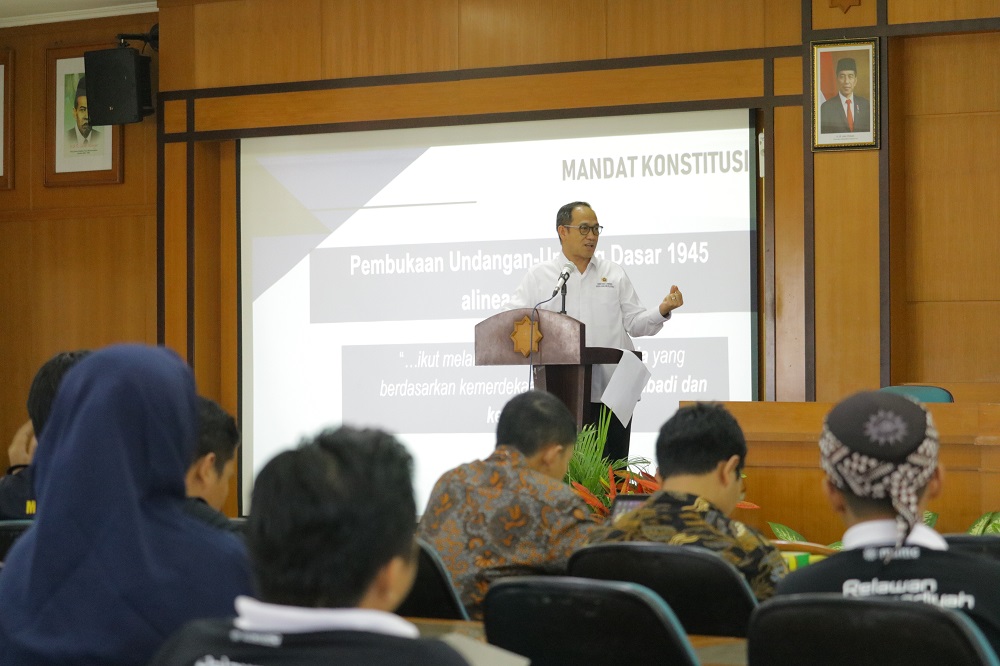 Indonesia is not the only country experiencing areas vulnerable to natural disasters. other countries are also experiencing natural disasters and conflicts that threaten human rights. To respond to several humanitarian issues at the global level and increase mitigation of disaster risk reduction, the Muhammadiyah Disaster Management Center (MDMC) held a panel discussion entitled “Muhammadiyah Internationalization Strategy through Disaster Risk Reduction and International Humanitarian Mission” on Saturday (1/2 ) in AR Fakhruddin B Building, Universitas Muhammadiyah Yogyakarta.
Indonesia is not the only country experiencing areas vulnerable to natural disasters. other countries are also experiencing natural disasters and conflicts that threaten human rights. To respond to several humanitarian issues at the global level and increase mitigation of disaster risk reduction, the Muhammadiyah Disaster Management Center (MDMC) held a panel discussion entitled “Muhammadiyah Internationalization Strategy through Disaster Risk Reduction and International Humanitarian Mission” on Saturday (1/2 ) in AR Fakhruddin B Building, Universitas Muhammadiyah Yogyakarta.
The discussion began with a teleconference by the Indonesian Ambassador to Lebanon, Hajriyanto Y. Tohari who discussed the internationalization of the Muhammadiyah movement in the field of disaster risk reduction and humanitarian missions in accordance with the results of the 47th conference in Makassar. “Muhammadiyah is the largest modernist Islamic organization in the world. Efforts should be made to internationalize the Muhammadiyah movement in the fields of education, social, health, disaster risk reduction, and human rights. Many things can be done to internationalize Muhammadiyah through cultural strategies,” he said.
Hajriyanto also explained that the cultural strategy is an internationalization strategy performed by Muhammadiyah in an effort to reduce disaster and humanitarian risks through theological and historical capital. “Muhammadiyah already has a historical capital, namely the establishment of the Oemat Tribulation Center (PKO) which was founded by KH.A. Dahlan. PKO aims to provide assistance to the community regardless of any obstacles. Whereas theologically, Muhammadiyah always applies Surah Al-Maun’s spirit of helping, generosity and volunteering towards people in need and such attempts are done culturally. This can also be applied in the Muhammadiyah movement for the global arena. Currently, Muhammadiyah, backed with the presence of MDMC, is in a good position to provide counseling of disaster fiqh to encourage Muslims to prepare themselves in disaster mitigation so that they are always on standby. With this, the cultural strategy of internationalization in addition to being based on al-ma’un’s theology must also be based on the opening of the 1945 Constitution, specifically the fourth paragraph,” he explained.
Furthermore, the Directorate of Human Rights and Humanity of the Indonesian Ministry of Foreign Affairs, Achsanul Habib explained the policies of the Indonesian Government under the Ministry of Foreign Affairs on the issue of humanitarian missions carried out through humanitarian diplomacy. “Regarding responding to issues or problems of humanitarian missions on the global scene, in accordance with the constitutional mandate contained within the fourth paragraph of the 1945 Constitution Preamble, we must participate in carrying out world order based on independence, lasting peace, and social justice. This becomes the basis for conducting humanitarian diplomacy to deal with humanitarian issues in various countries, especially in countries affected by disasters and conflict, ” He explained.
Achasanul also explained several policies regarding humanitarian missions in enhancing multi-stakeholder cooperation. “We from the Ministry of Foreign Affairs have domestic policies related to humanitarian missions to strengthen national regulations and human values, integrate international humanitarian values, voice humanitarian diplomacy and be active in humanitarian missions in the world and support humanitarian missions by Indonesian NGOs,” he explained.
This is in line with what was conveyed by Dr. Rahmawati Husein, MDMC Deputy Chairperson. She stated that some of the international humanitarian responses that have been carried out by Muhammadiyah are in accordance with the government’s mission in conducting humanitarian diplomacy. ”Some of the humanitarian responses on the global scene by Muhammadiyah have been done in various countries including, Palestine, the Philippines, Nepal, Myanmar, and Bangladesh. Furthermore, Muhammadiyah also succeeded in handling the impact of disasters in Central Sulawesi with the cooperation of international organizations including CRS, DFAT Australia, Won Buddhism, DRI, HEKS, Solidar, and TAF. In an effort to internationalize the Muhammadiyah movement’s strategy in the field of disaster risk reduction and humanitarian missions, Muhammadiyah has carried out humanitarian response activities on the global scene. However, in accordance with the theme of the upcoming Muktamar (conference_ which is “Advancing Indonesia, Enlightening the Universe” this strategy needs to be improved,” concluded the UMY Government Lecturer. (Sofia)
